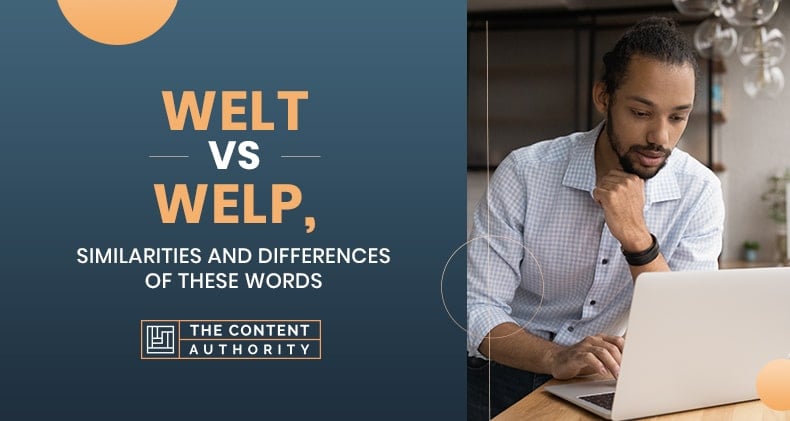We often encounter words that sound similar and mean different things. Sometimes one doesn’t even exist. Is this the case with “welt” and “welp”? Do they mean the same, or one of them is not real?
The word “welt” means a raised mark caused by a blow. It is to cause welts. “Welp” is an exclamation of well, when the word “well” is used as an exasperation. “Welt” could also be defined as to roll or revolve. The term has many different meanings, while “welp” just has one.
The similarities between the two words come from the sound they make while speaking. “Welt” and “welp” sound like an abrupt end for the word well.
This similar sound has brought confusion with the word whelp. They might sound alike and might cause people to write one for another, but they mean entirely different things.
Whelp means any young of various carnivorous mammals, especially dogs. The word could also refer to a boy or a girl, but we rarely use it and more often use a synonym like a cup or a puppy. Whelps are puppies, not a mark by a hard blow or an expression.
As a noun, “welt” has many definitions. Aside from what we already know, the “welt” is also a strip of material applied to a seam to strengthen it.
“Welt” is a narrow border.
“Welp” is considered slang. Slang is an informal vocabulary composed of changed words, extravagant, and forced figures of speech. Slang is a particular language, mostly made up of a specific group.
Where Does “Welt” Come From?
The meaning “ridge of skin from a wound” was first recorded in the 1800s. In the early 1500s, it was a shoemaker term, probably coming from the Middle English word Welten, meaning “to overturn, rollover.”
“Welt” is also associated with the word Velta from Old Norse, meaning “to roll.” “welt” is the German word for the world. Die “welt” means “The World.”
A “welt” is also known as a wheal and vice versa. Wheal comes from the Old English word Hwelian that means “to form puss, brings to ahead.” In the 1500s a wheal was a “pimpe or pustule”.
Like welt, it is in the 1800s that the best-known definition of the word is recorded. Both “welt” and wheal are “marks made on the skin by a whip.”
The difference nowadays between the two words, “welt” and wheal, is that wheal is used to describe a rounded or flat-topped mark on your skin that will disappear in 24 hours or so. “Welt” is a mark left by a blow that will last longer than that.
A “welt” is related to violence. A wheal refers to a skin condition not necessarily caused by violence.
Is “Welp” A Real Word? What’s Its History?
Yes, it is. “Welp” is a word that comes from the mix of the words: well and help. The term is used to express some resignation or as a sigh.
You probably have read many times the word “welp” in these digital times. Especially on social media. Users, public figures often use it, and even newspapers on their digital platform that you may think is a relatively new word.
And being a “new word” or slang used by an audience, you might feel the urge to correct a journalist or a public figure of their use.
Popular opinion is convinced that this term is as new as 1996 when the movie “Dumb and Dumber,” starring actors Jim Carrey and Jeff Daniels, hit the theaters. There’s a scene in a movie where Carrey’s character Lloyd Christmas says goodbye to two extras by saying, “well, see you later!” The way he says “well” sounds a lot like “welp.” This origin story is debunked, yet it is essential for the history of the word.
The first recorded use of the word “welp” dates back over 70 years. It first appeared, in written form, in the article “Thoughts on Yep and Nope” by writer Dwight L. Bolinger of the University of Southern California.
In the 1970s, the “p” at the end was described as a standard articulation of the word: “well.”
This means that when the lips came together to stop the word’s sound, it sounded like a “p” at the end.
The word still has no official description in a dictionary because people assume the use of “welp” was a form of saying “well” in a different pronunciation or dialect.
In the past decades, the word “welp” has been spreading way beyond everyday use in places like social media and blogs. Now you can find the word in books, newspapers, and broadcast.
It won’t be long before the word finds its official entry in a dictionary.

How About A Couple Of Sentences With Welt?
Considering “welt” and “welp” sound the same, people will understand what you are saying when the words are used in a certain way or tone and in a specific situation.
Examples
I’ll hand you a couple of welts with my belt boy, and we will see if you continue to badmouth your mom.
Yesterday I hit my head while cleaning the ceiling. It has left me a pretty noticeable “welt” on my forehead.
The boxing match was clearly one-sided. By the 3rd round, the challenger showed lots of welts on his face thanks to all the punches he received.
How Do I Use “Welp” In Real Life?
People often use “welp” to express disappointment or as a sigh, knowing that maybe something you were expecting to be a positive thing ended up being completely different.
Examples
- I’m sorry to inform you that we have to work Saturday and Sunday because we are way behind.
- Welp, there goes the weekend.
- Welp, it looks like we will be in quarantine for another month or so.
- The basketball game gets canceled when you arrive. Welp, I guess I will be turning back home.
Are There Any Other Words I Can Use For “Welt?”
- “Welt” is associated with violence. It is a hard blow that makes a lasting mark on your skin or body.
- To express this same meaning of the word “welt,” we can use lash, stinger, and wallop.
- Lash is to trash or beat violently. Lash is also a violent verbal retort.
- Stinger means a sharp blow or remark. It is something that stings.
- Wallop is to beat by a wide margin. It means to hit with force.
Examples
- When I got down, the ladder fell and lashed on my forehead hard.
- I just came from the doctor, and my arm hurts a lot because of the injection. The nurse really left a stinger on me.
- Last night, the front door neighbor started an argument with somebody and ended up with a wallop for his troubles.
Being A Sort Of Slang, Does “Welp” Have Any Other Words That Mean The Same?

“Welp” is a term that expresses a feeling. To be understood correctly, it needs body language and tone just like these words that could express the same: alright, okay, and really (use in the form of a rhetorical question).
By definition, these words don’t mean the same as “welp,” but in use can express the same feeling. Let’s see.
Examples
- Sorry, we are already closed for today.
- Alright, I’ll be back tomorrow then.
- The due date for the exam is Tuesday, not Thursday.
- Okay, I wasn’t expecting that.
- I won’t be able to make it to the movies tonight.
- Really? There goes my plan for the evening.
Conclusion
The only similarity “welt” and “welp” have is sound. They also get confused with the words: well and whelp. Both words sound like a stop of the word well before it is even finished. Yet, the difference between them is vast.
“Welt” is a bruise caused by a hard blow, and “welp” is an expression that means a slight disappointment.
To understand the meaning of “welt” or “welp,” it is crucial to have context. Otherwise, we won’t be able to tell them apart.
Shawn Manaher is the founder and CEO of The Content Authority. He’s one part content manager, one part writing ninja organizer, and two parts leader of top content creators. You don’t even want to know what he calls pancakes.


